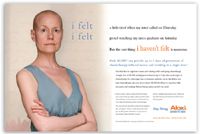Direct to Consumer: Emotional Connection
Pharmaceutical Executive
Realistic emotions in campaigns create the kind of conversation a woman would have with a close friend.
Women influence up to 80 percent of healthcare decisions for their households, and have more than $1.2 trillion in buying power. Yet, many pharma marketers don't have a firm understanding of how to craft their messages to resonate with this important group. As such, they are missing the opportunity to connect with female influencers—be they patients, caregivers, or professionals.

Marcee Nelson
Understanding how women communicate is key to understanding how to market to them successfully. Women are relationship-focused and oriented toward others—they're interested in personal stories, subplots, and context. Women bond with each other not by demographics but by shared experiences. They are caregivers and place a high value on reciprocal demonstrations of caring. When making decisions, women want to confirm the best choice, often soliciting the opinions of others. In return, they often influence the choices of their families and friends.
"Women don't buy brands," says cultural-trend analyst Faith Popcorn. "They join them." To that end, it helps for companies to think of their brand communications not simply as information, but as invitations to join a "brand club." Thinking about messages as invitations can help companies see their brands through the eyes of their potential customers. Finding the right brand invitation is key to fulfilling a brand's potential to connect with women.
The following three campaigns from Merck, AstraZeneca, and MCI Pharma illustrate how to effectively target women, and create memorable brands by building a shared experience and long-lasting connection.

Bonding Session Merckôs "Tell Someone" and AstraZenecaôs "If I Was Your Sister" television ad campaigns both feature real women offering advice and sharing experiences with people who may be in similar situations. In both ads, straightforward conversation is a central component.
Get Personal
When marketing to women, brand teams sometimes confuse making an emotional connection (engaging a consumer with insightful relevance) with being emotional in the message (trying to evoke a particular emotion from a reader). Making emotional pleas that come on too strong often backfire—women simply tune out.
AstraZeneca was careful to balance this approach with its recent disease-state campaign, "If I Was Your Sister." The TV spot features real-life breast cancer survivors who discuss the availability of post-surgery prevention options and the importance of therapy compliance. The company manages to stir positive emotions with upbeat encouragement of the benefits of prevention treatment, while delivering an honest message to breast cancer survivors: Their cancer could recur.
Patients' personal experiences, coupled with the "big sister" approach to sharing health advice, turns what could be an emotional land mine into an authentic and optimistic message. The spot encourages survivor "sisterhood," but the content is straightforward and credible, thereby striking the right emotional balance.

Touching Others MGI Pharmaôs campaign for Aloxi, a generic treatment for chemotherapy-induced nausea and vomiting, uses a striking visual and powerful quotes to stir emotions and create a bond between patient and ad
The campaign's positive focus on maintaining good health, versus simply avoiding disease, makes it effective. Convincing patients—women or men—to start or adhere to preventive pharmaceuticals is challenging. But behavioral psychologists believe that a "gain" message of staying healthier, like the AstraZeneca message, has a better chance of succeeding.
Invitation to Share
Merck has extended an invitation for women to share information about HPV (human papilloma virus) and to help other women prevent cervical cancer. In its television ad campaign for the generic HPV cervical-cancer vaccine Gardsil, "Tell Someone," women, many with their arms around their daughters, express their surprise at discovering the viral link of HPV to cervical cancer. In the ad, women encourage other women to tell someone they love about it.
The broadcast and print campaign also includes events in which celebrities like Maria Shriver and Elizabeth Rohm have participated. As part of the campaign, Shriver and Rohm publicly wore bracelets with the "Making the Link" logo, which helped generate buzz about the campaign.
Visitors to www.tellsomeone.com, Merck's Web site for Gardsil, will find a hip and inviting layout, with links to personal stories from a diverse group of women explaining how they discovered the HPV–cancer connection. E-cards, which can be sent with customized messages, are offered on the site to help visitors spread the word about HPV's role in causing cervical cancer.
Authenticity Counts
The recently launched brand-awareness campaign for MGI Pharma's Aloxi (palonosetron), which treats chemotherapy-induced nausea and vomiting, strikes a chord of authenticity that is missing in many DTC campaigns. It depicts a breast cancer patient who has lost her hair from chemotherapy—an extremely vulnerable time for any oncology patient
In an approach that might have scared away more timid marketers, the Aloxi campaign reflects both the ups and downs of chemotherapy treatment. In the ads, patients and caregivers share their stories, and admit feeling tired from treatment one day and being happy to be with family or friends the next. That sharing of both positive and negative feelings creates trust with female patients.
By including realistic emotions, the campaign creates a conversation similar to one a woman would have with a friend. Depicting a woman who is not afraid to be seen without her hair further enhances the "voice of truth" within the ad.
The Aloxi brand invites breast cancer patients to reveal their real strength, like the women in the campaign, and share their own personal stories. The campaign creates an emotional bond that makes the product's anti-nausea benefit resonate with its target audience.
The Merck, AstraZeneca, and MGI Pharma campaigns all include online virtual communities, where women feel comfortable and welcome. They all create a sense of dialogue—not monologue—and advocacy—not promotion. Through the sharing of personal stories, creating sisterhood, and offering intimacy, these campaigns demonstrate an understanding of how women communicate with one another, offering a brand invitation to which women want to respond.
Marcee Nelson is executive creative director of GSW Worldwide and the founder of Pink Tank. She can be reached at mnelson@gsw-w.com

The Misinformation Maze: Navigating Public Health in the Digital Age
March 11th 2025Jennifer Butler, chief commercial officer of Pleio, discusses misinformation's threat to public health, where patients are turning for trustworthy health information, the industry's pivot to peer-to-patient strategies to educate patients, and more.
Navigating Distrust: Pharma in the Age of Social Media
February 18th 2025Ian Baer, Founder and CEO of Sooth, discusses how the growing distrust in social media will impact industry marketing strategies and the relationships between pharmaceutical companies and the patients they aim to serve. He also explains dark social, how to combat misinformation, closing the trust gap, and more.